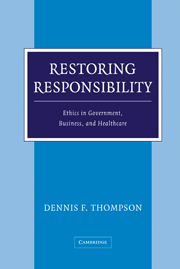Book contents
- Frontmatter
- Contents
- Acknowledgments
- Restoring Responsibility
- Introduction: The Need for Institutional Responsibility
- PART I DEMANDS OF INSTITUTIONAL POLITICS
- PART II VARIETIES OF INSTITUTIONAL FAILURE
- Part III EXTENSIONS OF INSTITUTIONAL RESPONSIBILITY
- 11 Restoring Distrust
- 12 The Institutional Turn in Professional Ethics
- 13 Hospital Ethics
- 14 Conflicts of Interest in Medicine
- 15 The Privatization of Business Ethics
- 16 Democratic Theory and Global Society
- Credits
- Index
12 - The Institutional Turn in Professional Ethics
Published online by Cambridge University Press: 29 January 2010
- Frontmatter
- Contents
- Acknowledgments
- Restoring Responsibility
- Introduction: The Need for Institutional Responsibility
- PART I DEMANDS OF INSTITUTIONAL POLITICS
- PART II VARIETIES OF INSTITUTIONAL FAILURE
- Part III EXTENSIONS OF INSTITUTIONAL RESPONSIBILITY
- 11 Restoring Distrust
- 12 The Institutional Turn in Professional Ethics
- 13 Hospital Ethics
- 14 Conflicts of Interest in Medicine
- 15 The Privatization of Business Ethics
- 16 Democratic Theory and Global Society
- Credits
- Index
Summary
One of the most important developments in the study of professional ethics in recent years is what may be called its institutional turn. This refers to a shift toward the study of ethical issues that are more salient in institutions than in relations among individuals or in structures of whole societies or states. This turn has only just begun and needs to be encouraged – but in the right direction. We can go further in that direction by analyzing some of the implications that follow from taking seriously the institutional context of professional ethics. The institutional turn is a response to an underlying social trend that has been going on for much longer: the institutionalization of the professions. This trend has been described as a shift from “social trustee professionalism” to “expert professionalism” (Brint 1994, 203–5). The traditional ideal in which professionals alone or in small groups serve their patients and clients in accord with a public-spirited goal has moved more toward practices in which professionals serve in organizations that value mainly their expertise and expect them to act in accord with the organization's goals. Often those goals are determined by the market, and economic pressures are an important part of this trend. But the organizational dimensions of the trend have been less discussed. They are also more general because they apply to both market and non-market institutions.
Professional ethics has been slow to take account of these social trends (see, for example, Chapter 13 in this volume). In the academic literature on ethics, whether applied or theoretical, the institutional dimension has rarely been prominent.
- Type
- Chapter
- Information
- Restoring ResponsibilityEthics in Government, Business, and Healthcare, pp. 267 - 277Publisher: Cambridge University PressPrint publication year: 2004



